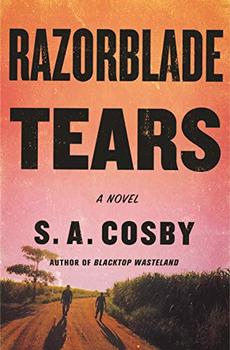Summary | Excerpt | Reviews | Beyond the book | Read-Alikes | Genres & Themes | Author Bio

A Novel
by S. A. CosbyAll the Sinners Bleed, the fourth novel by Southern noir author S.A. Cosby, begins with two apparently conflicting premises: first, that, despite the falsely optimistic narratives which some of its white natives cherish, "the South doesn't change… but comes back in ways worse than the way it was before;" second, that former FBI agent Titus Crown has become the first Black sheriff in the history of Charon County, Virginia.
Right away, Cosby establishes that this blood-and-tears detective thriller will explore the complications, even contradictions, that social progress and the restructuring of power bring— complications not everyone has to face equally. Crown's unprecedented authority places him in a "no-man's-land" between supporters, bigots, and those who consider him "a traitor to his race," all of whom it's his sworn duty to protect. Unfortunately for the sheriff—but fortunately for the reader interested in observing a nuanced struggle between duty and loyalty, instinct and procedure, good intentions and messy reality—Crown is confronted with a serial murder case that forces him to investigate every gray area associated with his new role.
Titus Crown knew what he signed up for though, and seems like the multitude-containing man for the job. A typical badass in terms of crime-fighting ability and the steely demeanor he can assume whenever he must, when his story begins he's popping in a Keurig pod and reflecting on how much better at gift-giving he's gotten after his girlfriend put him to shame in that department. A staunch atheist since that "blood and wine magic" broke his heart, he can quote the Bible like he's obsessed with it, which he is in a defiant sense. His mother's death from a rare and excruciating skin disease sealed his godlessness, as well as implanting in him a compulsion to control whatever he can in this world of senseless destruction. Paradoxically, chaos feels "rote" to law enforcement, who are involved in it constantly. It's starting to feel rote to civilians as well, who practically can't check the news these days without learning about another random shooting.
The mystery of the novel ensues when a young, mentally ill Black man enters Jefferson Davis High School and allegedly murders its long-beloved history teacher with a rifle. One of Crown's officers makes the call to take out the assailant even though he's holding his fire. The officer's knee-jerk reaction is to label the shooter a Muslim terrorist, misinterpreting the Aramaic he speaks in between his scriptural ranting as Arabic. Sheriff Crown knows the difference of course, and knows that nothing should be assumed about the young man's motivations or even culpability (no one actually saw him shoot the teacher) without evidence. And indeed, though many of the townspeople lock into their own biased interpretations of the matter, this murder and the murders of many Black children that it links to stem from a source of evil that is both unexpected and foreordained by the South's brutal history.
While the plot of All the Sinners Bleed isn't the sort of well-oiled twist machine found in the best whodunnits—the villains come and go too predictably, and what they have to declaim isn't nearly as compelling as the casual conversations Crown has with his family—the intricate themes it brings out provide plenty of stimulation. Racially charged responses to the school shooter confirm how people with prejudice to vent will eagerly do so in the guise of condemning an individual for their wrongdoings. The temptations of power are revealed when the righteous pursuit of a murderer pushes even Crown to "lean into the darker aspects of his position and his status" to get cooperation. And from the soul-crushing Confederate statue by the courthouse to the origin story of the killer, the book is suffused with the truth that long term damage is done by cherry picking certain parts of the past to (mis)remember while repressing others.
Also remarkable is Cosby's multifaceted writing style, which is as attuned to the quirky details of ordinary life as it is to the poetics of suffering. Here, he notes that Crown's kitchen chairs would "drive a hipster interior designer mad with nouveau retro euphoria," there, he compares a gunman's grip to a sea monster's tentacles and a crowd's horrified faces to Francis Bacon etchings. Imaginative, well-observed sentences continue to surprise the reader after the genre's grit and gloom get fatiguing.
It's ironic that Sheriff Crown is so hung up on disorder in the world when his existence plays out within the neat template of crime fiction, but then Cosby's specialty is bringing a familiar and formulaic entertainment to bear on the realities of life. All the Sinners Bleed is both an exciting thrill ride and an enriching meditation on race, authority, hate, and faith in America.
![]() This review was originally published in The BookBrowse Review in June 2023, and has been updated for the
August 2024 edition.
Click here to go to this issue.
This review was originally published in The BookBrowse Review in June 2023, and has been updated for the
August 2024 edition.
Click here to go to this issue.

If you liked All the Sinners Bleed, try these:

by Henry Wise
Published 2025
Holy City is the captivating debut from Henry Wise about a deputy sheriff who must work alongside an unpredictable private detective after he finds himself on the outs from his sheriff's department over his unwillingness to look the other way when an innocent man is arrested for murder.

by S. A. Cosby
Published 2022
A Black father. A white father. Two murdered sons. A quest for vengeance.
Your guide toexceptional books
BookBrowse seeks out and recommends the best in contemporary fiction and nonfiction—books that not only engage and entertain but also deepen our understanding of ourselves and the world around us.